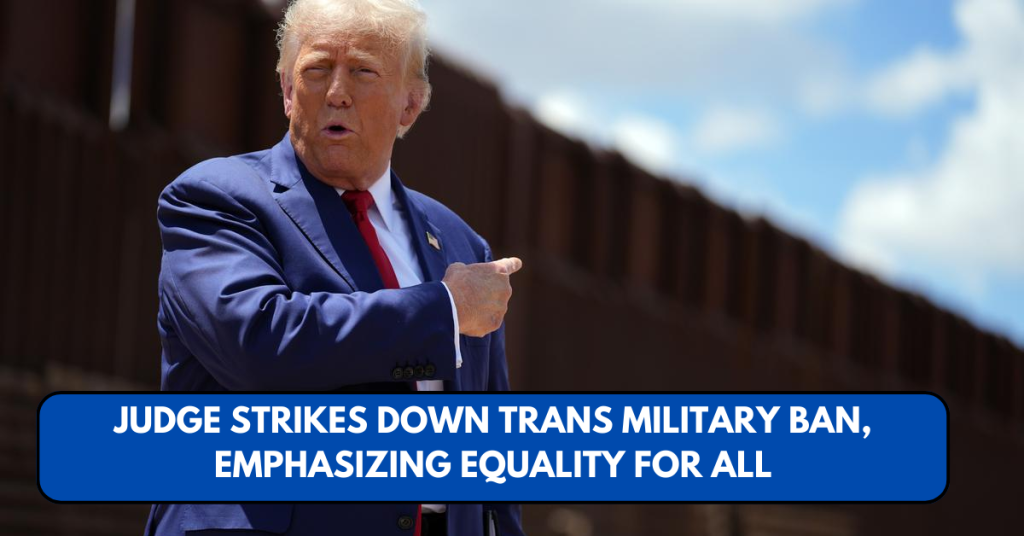
A U.S. federal judge has blocked the Trump administration’s attempt to reinstate a ban on transgender individuals serving in the military, marking a significant victory for LGBTQ+ rights. The ruling, issued by U.S. District Judge Ana Reyes on March 18, 2025, comes as part of an ongoing legal battle over equal protection under the Constitution.
A Landmark Ruling
In a strongly worded 79-page decision, Judge Reyes granted a preliminary injunction, preventing the enforcement of the policy that sought to bar transgender individuals from military service. The judge condemned the ban as unconstitutional, stating that it was “soaked in animus and dripping with pretext.”
“The U.S. military has a long history of excluding marginalized groups under the pretext of military readiness. This court will not stand idly by as constitutional rights are stripped away,” Reyes wrote in the ruling. “All means all.”
Background of the Ban
The legal battle began after former President Donald Trump issued an executive order aiming to reinstate a ban on transgender individuals serving in the U.S. military. The administration argued that allowing transgender individuals to serve would compromise unit cohesion and operational effectiveness. However, critics of the policy—including civil rights organizations and military leaders—argued that the move was discriminatory and unsupported by evidence.
The ban was initially introduced in 2017 but was later lifted under the Biden administration in 2021. The Trump administration’s renewed efforts in 2025 to revive the ban faced immediate legal challenges from LGBTQ+ advocacy groups, leading to this latest court ruling.
Legal Challenge and Plaintiffs
The case was brought forward by six active-duty transgender service members, represented by LGBTQ+ advocacy organizations GLAD Law and the National Center for Lesbian Rights. The plaintiffs argued that the ban violated the Equal Protection Clause of the Fifth Amendment and unfairly targeted a group of individuals based on gender identity.
“These brave service members put their lives on the line for our country, yet they have been subjected to discriminatory policies that have no basis in military readiness,” said Jennifer Levi, director of GLAD’s Transgender Rights Project. “Judge Reyes’ ruling affirms that discrimination has no place in our armed forces.”
Reaction from the Administration

The ruling has drawn sharp responses from the Trump administration. Defense Secretary Pete Hegseth announced that the Department of Justice would appeal the decision, arguing that the judiciary was overstepping its authority.
“This is a decision that defies the will of the American people,” Hegseth said in a press statement. “The President has made it clear that our military must be laser-focused on lethality and effectiveness, not social experiments.”
Meanwhile, LGBTQ+ rights organizations and progressive lawmakers hailed the ruling as a major victory. Senator Tammy Baldwin (D-WI), the first openly LGBTQ+ senator, praised the decision, calling it “a reaffirmation of American values.”
Impact on Transgender Service Members
For transgender service members currently enlisted, the ruling provides relief, ensuring that they can continue serving without fear of discharge due to their gender identity. According to estimates from the Williams Institute at UCLA School of Law, approximately 15,000 transgender individuals serve in the U.S. military in various capacities.
“The military is stronger when it reflects the diversity of the country it defends,” said retired Army Major General Gale Pollock. “Denying qualified individuals the opportunity to serve because of their gender identity is a step backward.”
Broader Legal and Social Implications
Judge Reyes’ ruling adds to a series of legal decisions challenging policies perceived as discriminatory against transgender individuals. The case could set a precedent for other pending legal battles, including challenges to restrictions on gender-affirming healthcare and policies affecting transgender students in schools.
Legal analysts suggest that if the case reaches the Supreme Court, it could lead to a landmark decision on transgender rights in the military. “This ruling underscores the importance of judicial oversight in protecting constitutional rights,” said Professor Shannon Minter, a constitutional law expert at Stanford University.
What’s Next?
As the Trump administration prepares to appeal, the case is expected to move to the U.S. Court of Appeals for the D.C. Circuit. If upheld, the injunction would remain in place, blocking the enforcement of the ban while further legal proceedings unfold.
For now, transgender service members can continue to serve openly, knowing that the courts have reaffirmed their right to do so.
For more information on military policies and transgender rights, visit:
- U.S. Department of Defense
- National Center for Lesbian Rights
- GLAD – LGBTQ Legal Advocates & Defenders
This is a developing story. Stay tuned for further updates.



